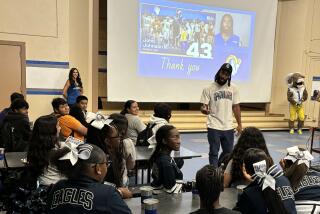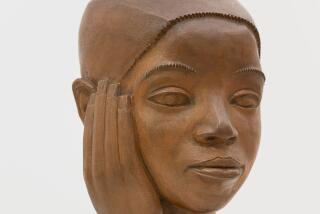Slubberdegullions, Read No Further
- Share via
Whatever happened to the English language? It’s a question I could imagine Samuel Johnson asking if he were alive today. The old lexicographer and author -- who once defined himself as “[a] writer of dictionaries; a harmless drudge, that busies himself in tracing the original, and detailing the signification of words” -- believed in nothing so much as the specificity of language, the idea that every word in English had both its meaning and its use.
These days, however, we’ve lost sight of this notion, reducing words to instruments of imprecision, tools to manipulate point of view. How much can words mean, after all, when one president declares himself “a Washington outsider” and another debates what the meaning of “is” is; when would-be writers use “journal” as a verb and many of us spend our evenings watching elaborately staged “reality” TV? When it comes to language, our entire culture has grown “buffleheaded,” a word no longer in the vernacular that means both “[a] man with a large head, like a buffalo,” and “dull; stupid; foolish.”
I discovered “buffleheaded” recently in a new edition of Samuel Johnson’s Dictionary, edited by Johnson scholar Jack Lynch, and it immediately became one of my favorite words. It’s incisive, definitely arcane, a word you don’t see anymore. The same, of course, is true of Johnson’s Dictionary, which in its age (and for a long time afterward) remained the standard for English usage.
Originally published in 1755, it was so influential, Lynch writes, that when the Oxford English Dictionary finally supplanted it 173 years later, the new work featured more than 1,700 definitions “lifted straight from Johnson and attributed to ‘J.’ ” What’s more, unlike the OED, whose first edition took 70 years to compile and required a small army of full-time lexicographers and volunteers, Johnson’s Dictionary came together in less than a decade, the effort of a working writer, and all of it, except the copying performed by six assistants, was Johnson’s toil alone. It was, in other words, a labor of love, a singular obsession, the dictionary as window to one man’s soul.
Johnson’s Dictionary wasn’t the first dictionary of English, or even the most extensive, but, as Lynch points out, “it was the most faithful record of the language people used.” Johnson offered words like “housewife” and “unorthodox” and “tree.” For this alone, his book is an invaluable record of the way English was spoken at a particular time, but it is his pointedness, his obsession with language that still defines the work, even 250 years later.
If a dictionary can be said to have a personality, this one does. You can almost see the glint in Johnson’s eye as he explicates words like “backfriend” (“a friend backwards; that is, an enemy in secret”) or “depucelate” (“to deflower; to bereave of virginity”) in phrases that read like lapidary epigrams. Has anyone ever asked you to engage in “deosculation” (“the art of kissing”)? Did you know that “ascii” is not just a computer code but a term for “people who, at certain times of the year, have no shadow at noon; such are the inhabitants of the torrid zone, because they have the sun twice a year vertical to them”?
This is the great pleasure of such a book, the way it returns language to us, expanding our ideas of what, exactly, English is. Partly, that’s because of Lynch, who, his own reservations to the contrary -- “No abridgement,” he writes, “can do justice to Johnson’s Dictionary” -- makes this monumental work manageable, winnowing its original 42,773 entries to 3,100. As ever, though, the real star here is Johnson, a man who staked himself on the endless flexibility of the English language, the way it seems to have a word for everything.
It’s tempting to leave it at that, to read Johnson’s Dictionary as a book of words both common and unconventional, or those that, like “gentile” (characterized here as “one of an uncovenanted nation; one who knows not the true God”), have changed their nuance over time. Still, in an era of spin, when meaning is devalued, I can’t help thinking of it as a call to arms.
To be fair, this may be how Johnson saw it also. Of the many words he catalogs, he has a particular fondness for those that, like “buffleheaded,” refer to dolts and dunderheads. There is “clodpate” and “clotpoll”; “mome” and “flopdoodle”; “merry-andrew,” “jack-pudding,” “slubberdegullion” and “pickthank.”
On the one hand, such affection is yet another revelation of Johnson’s personality, but it seems apropos for us as well. A language with so many 250-year-old words for “fool” is overdue for a kind of renaissance, especially in a time of recalls and tabloid news. It can speak for us and to us with absolute clarity, if only we would let it.
In that sense, Johnson’s Dictionary may be nothing so much as a corrective, just as it was in its own day. This is, after all, a book that offers the following elegant put-down for “politician”: “a man of artifice; one of deep contrivance.” How much more in tune with the times can you be?
David L. Ulin is the editor of “Another City: Writing from Los Angeles (City Lights, 2001) and “Writing Los Angeles: A Literary Anthology” (Library of America, 2002).
More to Read
Sign up for our Book Club newsletter
Get the latest news, events and more from the Los Angeles Times Book Club, and help us get L.A. reading and talking.
You may occasionally receive promotional content from the Los Angeles Times.











